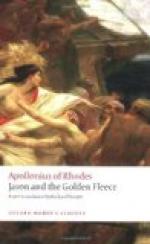Such were her words; and Aeetes came forth last of all and Eidyia herself came, the queen of Aeetes, on hearing the voice of Chalciope; and straightway all the court was filled with a throng. Some of the thralls were busied with a mighty bull, others with the axe were cleaving dry billets, and others heating with fire water for the baths; nor was there one who relaxed his toil, serving the king.
Meantime Eros passed unseen through the grey mist, causing confusion, as when against grazing heifers rises the gadfly, which oxherds call the breese. And quickly beneath the lintel in the porch he strung his bow and took from the quiver an arrow unshot before, messenger of pain. And with swift feet unmarked he passed the threshold and keenly glanced around; and gliding close by Aeson’s son he laid the arrow-notch on the cord in the centre, and drawing wide apart with both hands he shot at Medea; and speechless amazement seized her soul. But the god himself flashed back again from the high-roofed hall, laughing loud; and the bolt burnt deep down in the maiden’s heart, like a flame; and ever she kept darting bright glances straight up at Aeson’s son, and within her breast her heart panted fast through anguish, all remembrance left her, and her soul melted with the sweet pain. And as a poor woman heaps dry twigs round a blazing brand—a daughter of toil, whose task is the spinning of wool, that she may kindle a blaze at night beneath her roof, when she has waked very early—and the flame waxing wondrous great from the small brand consumes all the twigs together; so, coiling round her heart, burnt secretly Love the destroyer; and the hue of her soft cheeks went and came, now pale, now red, in her soul’s distraction.
Now when the thralls had laid a banquet ready before them, and they had refreshed themselves with warm baths, gladly did they please their souls with meat and drink. And thereafter Aeetes questioned the sons of his daughter, addressing them with these words:
“Sons of my daughter and of Phrixus, whom beyond all strangers I honoured in my halls, how have ye come returning back to Aea? Did some calamity cut short your escape in the midst? Ye did not listen when I set before you the boundless length of the way. For I marked it once, whirled along in the chariot of my father Helios, when he was bringing my sister Circe to the western land and we came to the shore of the Tyrrhenian mainland, where even now she abides, exceeding far from Colchis. But what pleasure is there in words? Do ye tell me plainly what has been your fortune, and who these men are, your companions, and where from your hollow ship ye came ashore.”
Such were his questions, and Argus, before all his brethren, being fearful for the mission of Aeson’s son, gently replied, for he was the elder-born:




